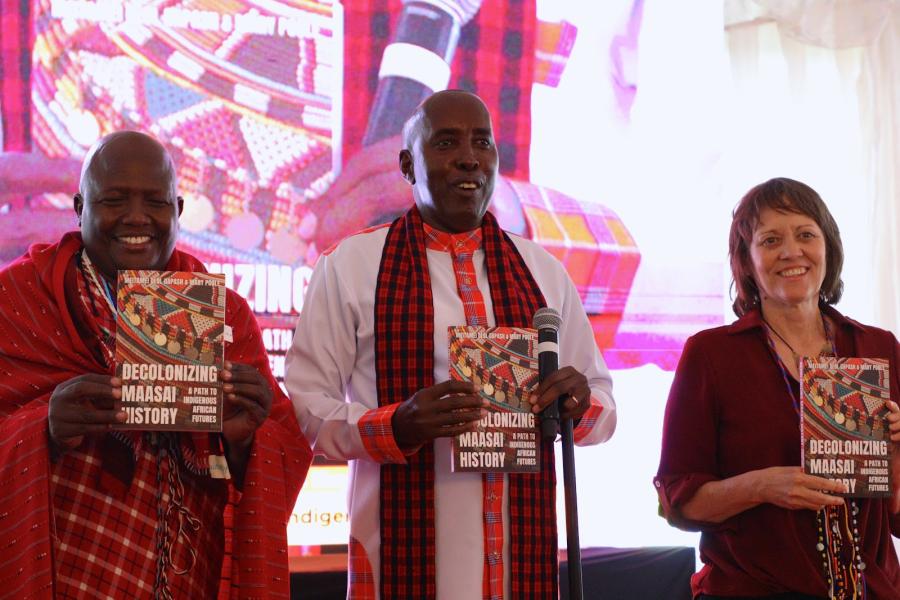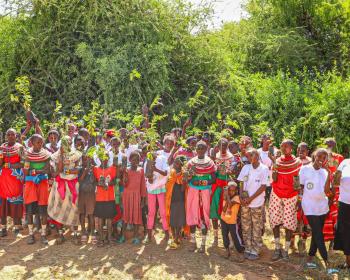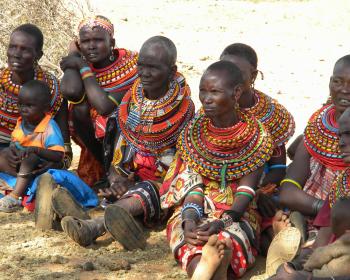Occupying a position marked by ethnic discrimination, social exclusion and violated rights, the Batwa ‘Pygmies’ of Africa’s Great Lakes region continue to fight a battle for equality that is steadily deteriorating their society. The Batwa, a forest hunter-gatherer group numbering approximately 70,000 to 80,000[1], are spread throughout Rwanda, Burundi, Uganda and the Democratic Republic of the Congo (DRC). Continually disabled by dominant neighbors and deforestation, today, the Batwa struggle is further compounded by surrounding ethnic wars that ravage the bystanding Batwa communities.
Traditionally, the Batwa have been deeply rooted in the forests of these regions, once recognized as the owners of the high forest of Uganda, and historically known as the first occupants of the Democratic Republic of the Congo. However, as local farmers began to cut down the forests in the early 20th century, the Batwa were left abandoned by their environment.
In 1930, Uganda established its National Parks of Mgahinga, Bwindi and Echuya on land originally belonging to the Batwa people; and, in 1991, the Batwa were officially evicted after decades of increasing privation. Similarly in the Democratic Republic of the Congo, the 1960’s creation of the Kahuzi-Biega Forest in South Kivu signaled a trend by international conservation groups and national governments to “forcibly expel Pygmies from newly declared game parks and forest preserves. They are evicted from their homelands and offered neither compensation nor recourse.”[2] Though the World Bank requested an assessment of the impact on the Batwa, and the Ugandan government responded with new provisions for displaced citizens, the Batwa were still barred from any benefits. By not participating as members of local governmental institutions, the Batwa were left unaffected by compensation efforts.
With the Batwa almost entirely expelled from these preserved areas, their self-sufficiency has been reduced to a position of landless tenancy. They must now resort to squatting on farmers’ land while selling their labor for food or begging for money, only reinforcing their imposed position of inferiority. The common stereotype of the Batwa ‘pygmy’ as ignorant, savage, and even subhuman is continually nurtured by the diminished social standing and reliance on dominant outsiders for subsistence.
Eviction from the forests has also meant an end to Batwa hunting practices, prompting a severe decline in health conditions. Descriptions of malnourishment were foreboding in a 1996 study of the Batwa ‘pygmies’ who were forced off the Kahuzi-Biega National Park land: “We met several people who claimed not to have eaten any meat, fish or other food rich in protein for more than a year. Many diseases develop due to a lack of hygiene.”[3] Used to treating illness with traditional medicines made from natural forest materials, the Batwa are now unable to access these resources, yet are equally incapable of paying for modern treatments. As a result, both the birth rate and the mortality rate are rising significantly.[4]
Though denied property rights remain the source of the Batwas’ impoverished state, recent ethnic warring has swelled the struggle for survival immeasurably. Provoked by the 1994 Rwandan genocide, violent relations have since become the established norm in much of the Great Lakes region. The vast Ituri territory is one such forested area in which the Batwa find themselves the minority caught in the crossfire. As the Hema and the Lendu, two of the largest ethnic groups in the region, fight for ownership over and grazing rights to this land, smaller indigenous people, including the Batwa, are exploited and exterminated as obstacles to progress.[5]
With these surrounding groups intensifying their goals to “ethnic cleansing” in 1999, “pygmies in the Ituri Forests have been hunted down, raped and massacred. ‘They are killed by one armed faction or the other simply for not having an identity card,’”[6] exclaimed Adolphine Muley, a Batwa ‘pygmy’ of the DRC and the representative of the Union for the Emancipation of Indigenous Women UEFA, when she spoke at the United Nations’ Permanent Forum on Indigenous Issues this past May. Ms. Muley also reported a growing number of Ituri pygmies falling victim to cannibalism: “These human beings are being killed, cut up into pieces, put on a fire in a pot and eaten. You must never see this, Mr. President; This, no more and no less, a crime against humanity.”[7]
Supporting this claim with eyewitness accounts, Mr. Sinafasi Makelo, a representative of Support Action for the Protection of the Rights of Minorities in Central Africa-DRC, stated that these actions “are an expression of deep-seated discrimination against pygmies.”[8] He continued by remarking, that “in living memory, we have seen cruelty, massacres, and genocide, but we have never seen human beings hunted down as though they were game animals.”[9] Whether the ethnic militias commit these murderous acts solely because of prejudice or because they believe that pygmy flesh can confer magical powers, as many claim, the horror prevails.
A Congolese government representative at the Forum, Ms. Njuma Ekundanayo, further explained the discrimination by admitting that other Congolese people do view the pygmies as subhuman. She revealed that “military tools today include rape, live burial and cannibalism, all aimed at extermination so that the perpetrators can have access to minerals and timber.”[10] Indeed, natural resources have piqued the interests of foreign business investors, promoting ethnic group rivalries as each party continually vies for profits from land sales. Amidst this endless sparring over land and power, the Batwa are a forgotten people deprived of the rights and respect to live.
Though awareness of the Batwa suffering is gradually spreading due to the efforts of advocacy groups and international NGOs, it is yet difficult to recognize any actual progress in the Great Lakes region. The historical Permanent Forum on Indigenous Issues held last May at the UN formally outlined the pygmies’ violated rights by indigenous representatives and leaders, and now appeals for action are beginning to gain force. An August report from Refugees International encourages Central African countries to extend citizenship rights to the Batwa people, and UNESCO has recently taken an active role in promoting their land rights. Today’s mission for peace and restoration of the Batwas’ basic human rights requires immediate and increased might, however; as Zephyrin Kalimba, president of the Rwanda Association for Indigenous People, has declared, “The Batwa families are very vulnerable and bound for extinction if nothing is urgently done.”[11]
[1] Minority Rights Group International. Available: (http://minorityrights.org/)
[2] Refugees International, “Forgotten People: The Batwa ‘Pygmy’ of the Great Lakes Region of Africa,” July 12, 2003.
[3] Gorilla Journal 13, “Pygmies in the Kahuzi-Biega National Park”, 12/96 (http://www.berggorilla.de/index.php?id=home&L=1)
[4] Gorilla Journal 13, “Pygmies in the Kahuzi-Biega National Park”, 12/96 (http://www.berggorilla.de/index.php?id=home&L=1)
[5] IrinNews
[6] Africa Recovery/afrol News, “Pygmies of Central Africa Still ‘Seen as Sub-human’”
[7] Taken from Adolphine Muley’s speech at UN’s Permanent Forum on Indigenous Issues, May 12-24 2003
[8] Africa Recovery/afrol News, “Pygmies of Central Africa Still ‘Seen as Sub-human’” (http://www.afrol.com/News2003/drc018_pygmies.htm)
[9] BBC News, “DR Congo Pygmies Appeal to UN” (http://news.bbc.co.uk/2/hi/africa/2933524.stm)
[10] Africa Recovery/afrol News, “Pygmies of Central Africa Still ‘Seen as Sub-human’” (http://www.afrol.com/News2003/drc018_pygmies.htm)
[11] IrinNews, “Batwa Appeal to Government for Affirmative Action”, 03/23/2003 (http://www.irinnews.org/report.asp?ReportID=33094&SelectRegion=Great_Lakes&SelectCountry=RWANDA)



